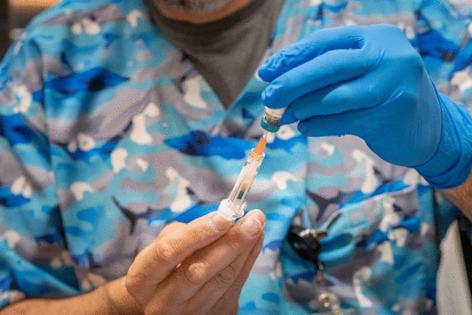RFK Jr. panel sparks chaos, muddies long-set vaccine schedule
Published in News & Features
U.S. Health Secretary Robert F. Kennedy Jr.’s handpicked panel was expected to overhaul longstanding immunization recommendations for children this week.
It didn’t go as smoothly as planned.
Public health experts had been bracing for the Centers for Disease Control and Prevention’s Advisory Committee for Immunization Practices, or ACIP, to upend the established rhythm of childhood shots in the U.S. The regimen is credited with controlling scores of diseases that previously disabled or killed millions of Americans.
What unfolded instead were two days of delays, technical glitches, abrupt reversals and hot-mic insults that raised questions about the committee’s preparedness. Kennedy had just appointed five of the panelists on Monday.
“We are rookies,” Martin Kulldorff, the committee’s chairman, said as the second day of the meeting began on Friday.
In spite of the disorder, the panel agreed on changes to U.S. policies that would have been difficult to envision a year ago — and that will further muddy the waters around shots that long enjoyed broad acceptance. But it also fell short of the wholesale rejection of trusted vaccines that many observers had feared.
As expected, ACIP declined to back a combined shot for measles, mumps, rubella and chickenpox that some families prefer, though it preserved the option to receive the inoculations in two separate shots. Panelists pointed to evidence of increased fever-related seizures when the combination vaccine, or MMRV shot, is given to the youngest children.
The committee also voted against permitting a U.S. vaccine program to pay for the combined shot — after initially allowing it. And it decided to put off a decision on limiting access to the hepatitis B vaccine, which has been given to newborns for decades in the U.S.
Doctors complained that the proceedings created uncertainty where there had been consensus, misleading families and physicians attempting to make informed decisions about children’s health.
“Instead of emerging with clear guidance about vaccines that we know protect against serious illnesses, families are left with confusion, chaos and false information,” the American Academy of Pediatrics said in a statement on Thursday.
Kennedy has long been skeptical of vaccines and has claimed that some shots increase the risk of autism and other adverse effects. Ahead of this week’s meeting, some U.S. health insurers indicated they would continue to pay for immunizations even if ACIP changed its recommendations.
ACIP also voted Friday to end a universal recommendation that people of all ages receive a COVID-19 shot, saying Americans should confer with a medical professional before getting one.
Public health experts were largely relieved the committee didn’t restrict access to COVID shots further, but worried about the new recommendations creating more confusion, especially for seniors.
Rocky proceedings
The ACIP meeting, which was held at CDC headquarters in Atlanta, faced missteps from the start. Slides weren’t uploaded in advance for experts to review. Voting questions weren’t announced until the meetings were underway.
At several points, panelists appeared to forget their microphones were on. Some discussed the best New England vacation spots. One participant derided another as an “idiot.” A panelist attending via Zoom chided Kulldorff for continuously muting him.
After spending much of Thursday debating the rationale behind giving the hepatitis B vaccine at birth, the committee postponed its vote on the issue. The panelists said they needed more time to consider the evidence and raised concerns about voting language that suggested decisions should be shared by doctors and parents.
The newborn hepatitis B recommendation has been in place since 1991. Doctors and medical groups say it’s critical to prevent chronic infection later in life, though in some countries the inoculation is given two to three months after a child’s birth.
Also Thursday, the group made what appeared to be an oddly split decision, voting against backing the combined MMRV vaccine, made by Merck & Co., while endorsing its use by Vaccines for Children, a program that provides inoculations for kids whose parents can’t afford them. More than half of U.S. children are eligible for the program, according to the CDC.
Then, on Friday, the panel reversed its endorsement of the combination shot for kids in the VFC program after members complained that the voting question had been confusing.
“This decision was based on a significant reduction in febrile seizures associated with using MMR and V in separate injections,” a spokesperson for HHS said, emphasizing that the separate vaccines would be covered by all health-insurance programs.
Confused parents
Some parents said the ACIP meeting had left them more uncertain about whether their children would be eligible to receive vaccines and how they could obtain them.
Rebecca Beno, a parent in Chicago, said she has struggled to get the COVID-19 shot for her daughter, who is 2 and a half. Now, she’s worried other vaccines also won’t be available. She plans to ask her pediatrician to administer a second dose of the MMR vaccine early at her daughter’s upcoming appointment.
“It’s scary, especially now with measles cases popping up all over,” Beno said. “Everyone’s confused, everyone’s nervous.”
Medical associations including the Infectious Diseases Society of America tried to counteract false statements from the hearing in real-time on social media. Before the meeting, state coalitions released their own vaccination guidelines in a vote of no-confidence in ACIP.
“This is the first time in the history of the U.S. where states and medical societies are making their own recommendations completely at odds with the CDC,” Lawrence Gostin, faculty director of the O’Neill Institute for National and Global Health Law at Georgetown, said in an interview. “That’s not normal.”
———
(With assistance from Rachel Cohrs Zhang.)
©2025 Bloomberg L.P. Visit bloomberg.com. Distributed by Tribune Content Agency, LLC.







Comments